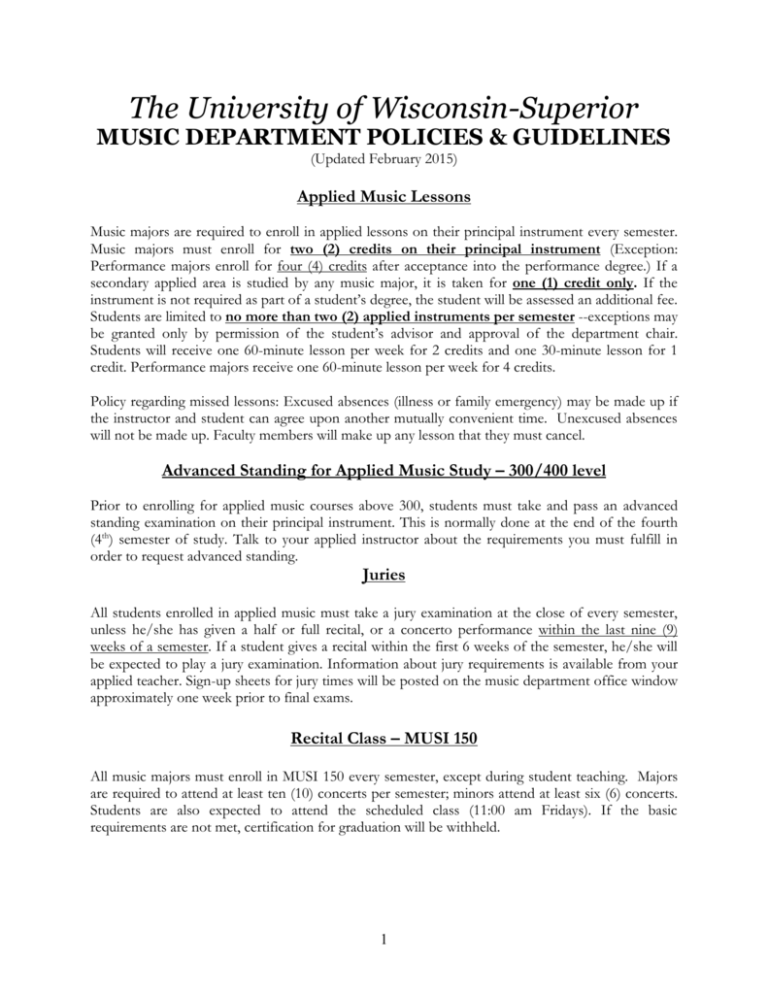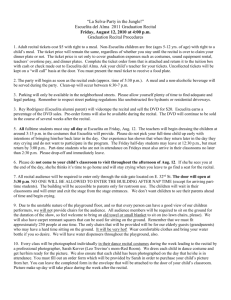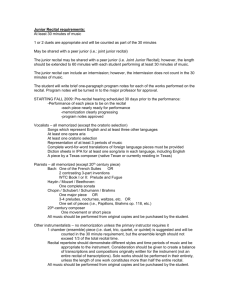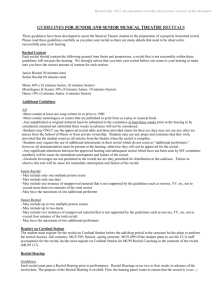Music Department Policies - University of Wisconsin
advertisement

The University of Wisconsin-Superior
MUSIC DEPARTMENT POLICIES & GUIDELINES
(Updated February 2015)
Applied Music Lessons
Music majors are required to enroll in applied lessons on their principal instrument every semester.
Music majors must enroll for two (2) credits on their principal instrument (Exception:
Performance majors enroll for four (4) credits after acceptance into the performance degree.) If a
secondary applied area is studied by any music major, it is taken for one (1) credit only. If the
instrument is not required as part of a student’s degree, the student will be assessed an additional fee.
Students are limited to no more than two (2) applied instruments per semester --exceptions may
be granted only by permission of the student’s advisor and approval of the department chair.
Students will receive one 60-minute lesson per week for 2 credits and one 30-minute lesson for 1
credit. Performance majors receive one 60-minute lesson per week for 4 credits.
Policy regarding missed lessons: Excused absences (illness or family emergency) may be made up if
the instructor and student can agree upon another mutually convenient time. Unexcused absences
will not be made up. Faculty members will make up any lesson that they must cancel.
Advanced Standing for Applied Music Study – 300/400 level
Prior to enrolling for applied music courses above 300, students must take and pass an advanced
standing examination on their principal instrument. This is normally done at the end of the fourth
(4th) semester of study. Talk to your applied instructor about the requirements you must fulfill in
order to request advanced standing.
Juries
All students enrolled in applied music must take a jury examination at the close of every semester,
unless he/she has given a half or full recital, or a concerto performance within the last nine (9)
weeks of a semester. If a student gives a recital within the first 6 weeks of the semester, he/she will
be expected to play a jury examination. Information about jury requirements is available from your
applied teacher. Sign-up sheets for jury times will be posted on the music department office window
approximately one week prior to final exams.
Recital Class – MUSI 150
All music majors must enroll in MUSI 150 every semester, except during student teaching. Majors
are required to attend at least ten (10) concerts per semester; minors attend at least six (6) concerts.
Students are also expected to attend the scheduled class (11:00 am Fridays). If the basic
requirements are not met, certification for graduation will be withheld.
1
MUSI 150 Performance Requirement for Music Majors
All music majors must perform in Recital Class- MUSI 150 (11:00 am Friday) every semester.
Freshmen and transfer students are exempt their first semester of study. This performance
requirement applies to the student’s principal instrument only, not to secondary instruments.
Junior or senior recitals may be substituted for the requirement as well as solo concerto
performances with orchestra. The date of the recital class performance and the performance
selection should be recorded on the semester’s jury sheet. Applied grades will be lowered if the
performance requirement is not met.
Procedures for Presenting Student Recitals
All students presenting evening recitals must be enrolled concurrently in the appropriate applied
music course with a UW-Superior instructor. All recitals must be approved by a hearing committee
(at least three {3} full-time faculty or 2 full time faculty and the student’s applied lesson instructor)
at least 20 days prior to the recital performance. Students failing to present an adequate level of
preparation will have the recital cancelled until the following semester.
If video equipment is desired, students may check it out from Technology Loan Services in Swenson
Hall. Students may not use music department camcorders or other equipment. Recital programs
(and program notes) must be received by the academic department associate in the Music Office no
later than ONE WEEK before the recital. Acknowledgements and gratitudes are not permitted in
programs.
All BME majors are required to present a half recital during their senior year, preferably before
student teaching. All BM-Performance majors are required to present a half recital during their
junior year and a full recital during their senior year. IMPORTANT: Students planning a fall
semester recital must reserve the date no later than 14 days after the beginning of the fall
semester. Students planning a spring semester recital must reserve the date no later than the
last day of classes in the fall semester. Recital dates can be reserved only by consultation with Dr.
Gilbert, plus approval of the appropriate applied instructor.
Ensemble Requirement for Music Majors
Music majors are required to participate in a major ensemble every semester, except during student
teaching. The 3 major ensembles are: Symphonic Band (for woodwind, brass and percussion
majors); University Orchestra (for string majors); Acappella Choir (for voice majors). Keyboard
and guitar majors will choose a suitable ensemble according to their secondary interest/capability.
Music Bulletin Board – Official Music Dept. Information
The official bulletin board for the music department is located on the south wall of the vending
machine area. Please check the bulletin board daily for general information and notices, rehearsal
schedules/changes, concert publicity, and messages from faculty.
2
Instrument Rental
String, wind and percussion instruments are available to members of the bands and orchestra with
no rental fee. The student assumes full responsibility for an instrument from the time it is checked
out until the time it is returned. This responsibility includes charges for damage to an instrument. If
an instrument is lost or damaged beyond repair, the student will be responsible for replacement
costs for a new instrument.
Lockers
All music majors and minors may be assigned an individual locker through the music office. If
additional space remains after all majors and minors have been assigned, non-majors participating in
ensembles may request a locker. Perishable food cannot be kept in lockers. Students must clean out
their lockers at the end of each school year, whether returning or not.
Copying or Xeroxing of Music
The music department does not authorize anyone to make copies of printed and copyrighted music.
Copying music and/or recordings to avoid purchase is illegal and can be prosecuted.
Computer and MIDI Labs
The computer lab is located in room 1182 for use by any enrolled university student. The MIDI Lab
is located in Room 1105 (see the academic department associate for access). No Internet use/surfing
allowed in MIDI Lab. The penalty for such activity will be revocation of MIDI Lab privileges.
The University Library and Music Holdings
Music CDs are located in the Jim Dan Hill University Library. CDs may be checked out by students
upon presentation of a university ID at the circulation desk. CDs and headphones for use within the
Library are available at the Main Desk. There are multiple individual listening stations and group
listening rooms.
After-Hours Pass
Any student wishing to practice after the official HFAC closing hours (usually 10 pm) may obtain an
“After-Hours Pass” upon request in the Music Office.
Practice Room Rules
We enjoy excellent practice facilities. Most are furnished with newer Kawai upright pianos, located
in locked rooms. Music majors may be issued keys to these rooms upon request in the music office.
Some practice rooms with older pianos will be left unlocked for use by any university student
including elementary ed. majors who need to use pianos to prepare their coursework.
BOOKS, INSTRUMENTS, AND PERSONAL BELONGINGS MAY NOT BE LEFT IN
THE PRACTICE ROOMS. NO FOOD OR BEVERAGES IN THE PRACTICE ROOMS
(Water bottles are permitted as long as not placed on top of the pianos.) There are no assigned
3
practice rooms – some conservatory teachers may reserve time for their teaching, but rooms are
available to all music majors when not in use for conservatory teaching.
Grand Piano Rooms - HFAC 1149, 1151 & 1153 - Practice rooms with Steinway grand pianos are
to be used only by advanced pianists studying applied piano. Key requests will be signed by Dr.
Gilbert.
Organ Practice Rooms - Organ practice rooms are available only to students studying applied
organ. Key requests will be signed by Dr. Gilbert.
Violation of Practice Room Privileges - Any student found in violation of practice room
regulations will be issued a warning for first offense and have their practice room privileges
suspended upon repeat offenses. Any damage to the practice rooms or the pianos will be the
financial responsibility of the student.
Pass/Fail Option
With the exception of MUSI 150, no music major or minor may take any required music course on a
“Pass/Fail” basis.
Incompletes
As stated in the University Catalog, a grade of Incomplete (“l”) may be given by an instructor
ONLY when the student has been engaged for at least two-thirds of the semester. There should be,
in the judgment of the instructor, a reasonable probability that the student can complete the course
successfully without again attending regular class sessions. A grade of Incomplete must be removed
by the end of the next semester of attendance.
Class Attendance
Students are expected to attend all classes. Absence from class may only be excused by the
instructor, not the student. Consult the appropriate class course syllabus for proper procedures for
notifying an instructor in case of illness or emergency.
Dress Code for Recital Class Performances
When performing for 150 Recital Class (11:00 am Fridays), personal appearance is extremely
important. By looking your best, you increase the likelihood of a successful performance.
The following dress code is in effect:
Men & Women: NO DENIM. This includes skirts, jackets, vests and jeans.
Dress shoes only – No flip-flops. No sandals. No tennis shoes. No bare feet in shoes.
Men – Long or short-sleeved shirts with collars. No t-shirts. Dress slacks should be worn.
Ties are optional.
Women – Skirts, dresses or dressy pants are appropriate. Skirts/dresses should be knee-length or
longer. No sleeveless, strapless, or off-the-shoulder tops or blouses. Tops must be long enough to
cover the midriff while seated. Low-cut tops and mini-skirts are not appropriate.
An important point to remember: Keep the focus ON THE MUSIC --- not your clothes or body.
4
Additional Department Policies
1.
2.
3.
4.
No student may add applied lessons after the first four (4) weeks of any given semester.
Students must complete MUSI 102/103 before enrolling in MUS 271 or 273.
A half recital (MUS 395) and full recital (MUS 495) cannot be given the same semester.
Applied lessons may not be substituted for techniques classes. Any exceptions must be
approved by the Department Chair.
5. Any student not earning a C- or higher in a core-required music course (Theory, ET, Class
Piano, Music History, etc.) will be required to repeat the course. If the second attempt is
unsuccessful, the student will be suspended as a music major and advised into a more
appropriate major course of study.
PIANO PROFICIENCY EXAMINATION
All music majors, except keyboard majors, must pass the piano proficiency test prior to student teaching
(music education majors) or one semester prior to graduation (all other majors). Students who do not pass the
piano proficiency test on the first attempt will be required to play remaining portions the following semester.
Transfer students must either take the UWS piano proficiency test or provide evidence of successful completion
of a test of equal difficulty. That evidence must include a signed letter or personal email from the previous
instructor plus a copy of the previous school’s piano proficiency requirements.
The piano proficiency test is scheduled every semester during Final Exam week. The requirements are as follows:
1. SCALES - Major and harmonic minor– hands together, 2 octaves.
Play in eighth notes with quarter note at M.M.= 80.
2. ARPEGGIOS - Major and minor – hands together, 3 octaves.
Play in eighth notes with quarter note at M.M.= 60.
3. ACCOMPANIMENT – for your major instrument or voice type, approved by Mr. Sandor.
4. SIGHTREADING – you will be given a piece of early-intermediate level to sight-read.
5. 3 PREPARED PIECES (approved by Mr. Sandor). One of these pieces must be memorized.
a. Baroque piece (preferably J.S. Bach) such as a minuet, musette, or gavotte.
b. The first movement of a Classical sonatina (Clementi, Kuhlau, Beethoven, Mozart)
c. A 19th or 20th century piece, at least 24 measures in length.
5








